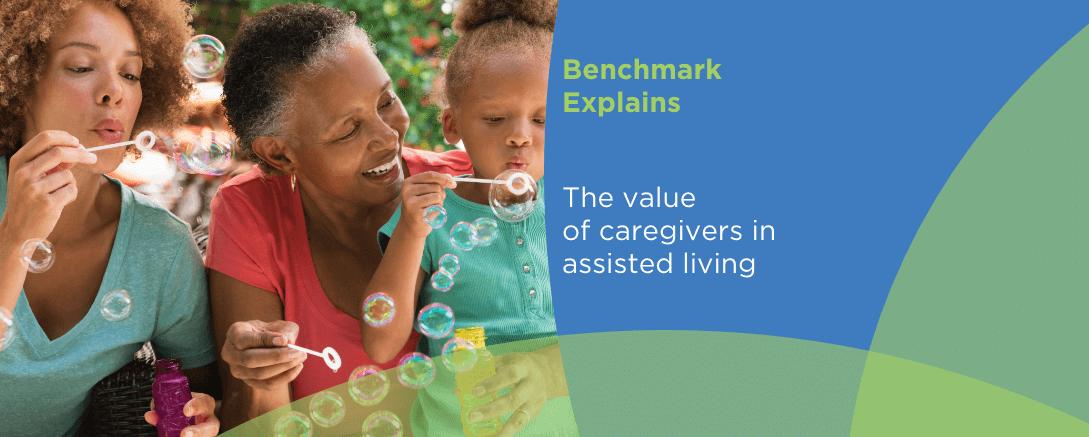What Makes a Senior Living Community a Happy Home?

When top executives in various industries are asked what makes their organization successful, they typically answer, “the people.” In the senior living industry, perhaps more than others, people really do make the difference.
At independent living communities, residents interact daily with administrators, concierges, activity directors, dining staff, and physical fitness instructors, among others. In assisted living and skilled nursing, residents share daily connections with a variety of people, but perhaps most closely with nursing and personal care staff. The relationships that senior living residents forge with the people who serve, assist and care for them are likely to determine their wellbeing as well as their overall quality of life.
The Hierarchy of Senior Assisted Living Staff
People are an important factor at every level of a senior living organization. It starts at the very top with the executive team and board of directors who set the tone for the quality of the organization with their strategic decision-making and policy-setting. The leadership of senior living companies is responsible for impactful decisions that establish such physical factors as community locations, layouts, residential units, and on-site amenities like physical fitness centers, swimming pools, dining areas, lounges, and outdoor spaces. Leadership also sets policies with regard to such important issues as pricing, staffing, safety, security, and residential requirements.
Each community has a hierarchy of staff that makes important decisions having an impact on the quality of life for the community’s residents. The executive director is responsible for creating and maintaining a high-performing team within the community and establishing an environment that is conducive to providing high-quality services. Operations is responsible for ensuring the maintenance, cleanliness, safety, security, and overall efficiency of a senior living community, which is essential to the smooth day-to-day functionality of the place that residents call home.
In the dining area, chefs, food preparers, and servers are tasked with preparing good-tasting, nutritious meals three meals a day—a very important job function since many residents consider mealtime to be the highlight of their day. Activity directors also have an important job, coming up with a broad and varied schedule of things to help keep a diverse population of residents busy, engaged, and happy.
How Caregivers Can Make a Real Difference in Assisted Living
On the basis of how directly they impact and influence the residents’ lives, certainly the quality of nurses, therapists, resident care providers, aides and receptionists is one of the most important “people” components at a senior living community. Hiring people who are knowledgeable and compassionate is essential to meeting the needs and expectations of residents.
The ability for the staff to develop strong relationships with residents is a critical component to residential satisfaction, which is why one of the most important challenges for senior living providers is to step up their efforts to attract and retain quality employees. This means offering competitive pay, good benefits, and putting the emphasis on creating a quality workplace and increased job satisfaction. Focusing on what employees want and need is important to facing the challenges of employee retention in this strong and competitive job market.
In the senior living space, there’s also growing recognition of the importance of “person-centered care.” This means putting emphasis on the specific needs and preferences if the individual being cared for. Person-centered care is most effective when caregivers know the individual and are able to establish an ongoing relationship with that person. This not only applies to senior living communities but also the health care providers, agencies, and support organizations that serve those in our older population.
The Value of Hiring Associates that Love Seniors
In the January/February 2019 edition of Senior Living Executive magazine, Linda Silveira, Executive Director of Greenwich Farms at Warwick, a Benchmark community in Rhode Island, devoted a column to the importance of a people-centered senior community. Her piece, How to Help Your Residents Write Their Next Chapter, instructed community leaders to look to family members for valuable input on resident preferences, personalities, and more: but it also went deeper, encouraging communities to give residents an opportunity to share their stories, to have a voice, and to have an active role in penning this new chapter of their lives.
In an interview with Linda, she added, “When hiring associates in assisted living, it’s essential to identify candidates who truly love seniors and want to make a difference in their lives. Then create an environment that encourages associates to take a genuine interest in the residents’ lives – getting to know their history, interest, desires, and dreams. As the relationships develop between the associates and the residents, so do the opportunities to create meaningful moments. By truly knowing our residents, we can help them to write the next chapter in their lives.“


